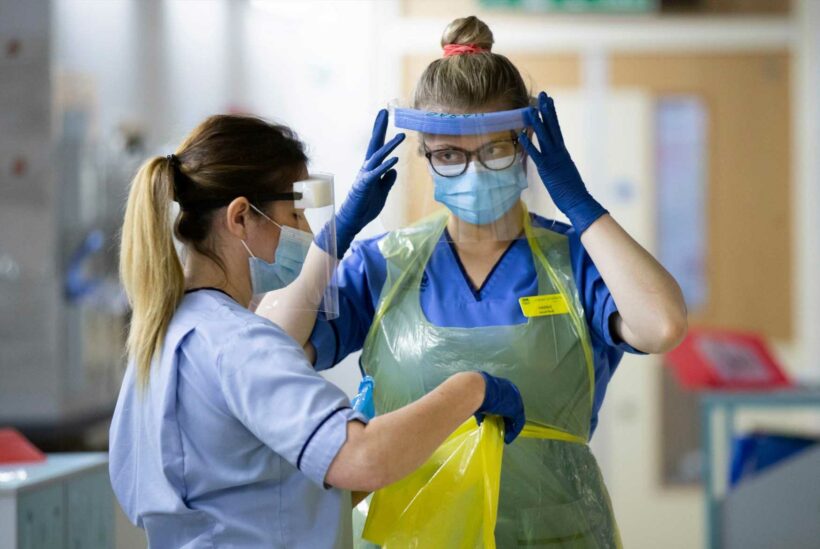UP to 8,700 patients died after catching Covid while in hospital being treated for something else.
The figures, provided by the hospitals, have been described by relatives of those who died, as “horrifying”, reports The Guardian.
🔵 Read our coronavirus live blog for the latest updates
Hospital acquired Covid – which reportedly has caused “many thousands” of unavoidable deaths – has been described by former health secretary Jeremy Hunt as “one of the silent scandals of this pandemic”.
Senior doctors and NHS leaders have long said hospitals have struggled to prevent the virus spreading like wildfire throughout the hospitals – because of shortages of single rooms, a lack of PPE and an inability to test staff and patients early in the pandemic.
The hospital responses showed that every trust had to grapple with the issue of hospital-acquired infection.
Many hospitals were not able to keep Covid-positive patients separate from those without the disease – this played a hand in the virus’ lethal transmission.
Data obtained near the end of last year suggested one in six infections had taken place on wards.
At the start of December, one NHS Trust in England recorded nearly four in every 10 Covid infections were picked up on its wards.
Hampshire Hospitals NHS Foundation Trust said 139 out of its 357 Covid-19 patients caught the virus after being admitted.
At Epsom and St Helier University Hospitals NHS Trust the figure was 36.6 per cent.
And now, official figures supplied by NHS trusts across England show that a probable 32,307 people have probably or definitely contracted the disease while in hospital since March 2020.
Of these people, 8,747 had died, meaning almost three in 10 (27.1%) of Covid patients infected in hospital lost their lives within 28 days.
Mr Hunt, who chairs the Commons health and social care select committee, said: “The NHS has done us all proud over the past year, but these new figures are devastating and pose challenging questions on whether the right hospital infection controls were in place”.
The new data was obtained by the Guardian under freedom of information laws from 81 of England’s 126 acute trusts.
The data pointed to University Hospitals Birmingham as having the highest number of deaths (408) followed by Nottingham University Hospitals (279) and then Frimley Health (259).
Nine of the trusts had more than 200 deaths.
The death toll was influenced by factors like the hospital’s size, the number of single rooms and capacity of its intensive care unit.
The makeup of its local population and level of infection among them was also a factor, as was weaknesses in infection control procedures.
According to the new data, the 8.747 people who died were initially admitted into hospital for another reason – such as a flare up of a serious illness, treatment for a fall, or to have an operation.
The figures were inclusive of both people who died in hospital and those who died after discharge.
The figures provided a new insight into how widespread and devastating hospital-acquired Covid has been over the past 15 months.
Forty-five trusts did not comply with requests to disclose their death figures, despite it being their legal obligation to do so.
The Covid-19 Bereaved Families for Justice UK campaign was urging ministers to act before a third wave, which they feared could be driven by the Indian variant.
Matt Fowler, the group’s co-founder, said: “The mortality rate for patients and staff who were infected in hospitals is horrifying and must be stopped from happening again ahead of a potential third wave.
“On issues such as segregating patients on wards, PPE for frontline workers and testing patients who are discharged, there are critical questions around how prepared hospitals were and the resources they were provided.”
All NHS trusts were required to monitor how many people had caught Covid in their hospitals – something that was said to be ‘probable’ if someone tests positive between eight and 14 days into their stay.
An inpatient’s positive test result 15 days or more after admission was deemed a “definite” case of hospital-acquired infection.
Fowler said Boris should bring forward the public inquiry he had promised – from 2022 to this summer – in an attempt to speed up production of a report that would include best practises on preventing transmission within hospitals.
“Not doing so puts more lives at risk,” he said.
Dr Claudia Paoloni, president of the Hospital Consultants and Specialists Association, called the death toll “a human tragedy”.
An NHS spokesperson insisted hospitals were not to blame.
A spokesperson said: “The Office for National Statistics and other data conclusively demonstrate that the root cause of rising infection rates in hospitals is rising rates in the community and throughout the pandemic weekly reports from Public Health England have consistently shown that outbreaks in hospitals are less common than in other settings.”
Hospitals had “robust infection control measures” in place, they said, including treating Covid and non-Covid patients in separate areas and testing all inpatients on admission and twice in their first week, the spokesperson added.
Source: Read Full Article






